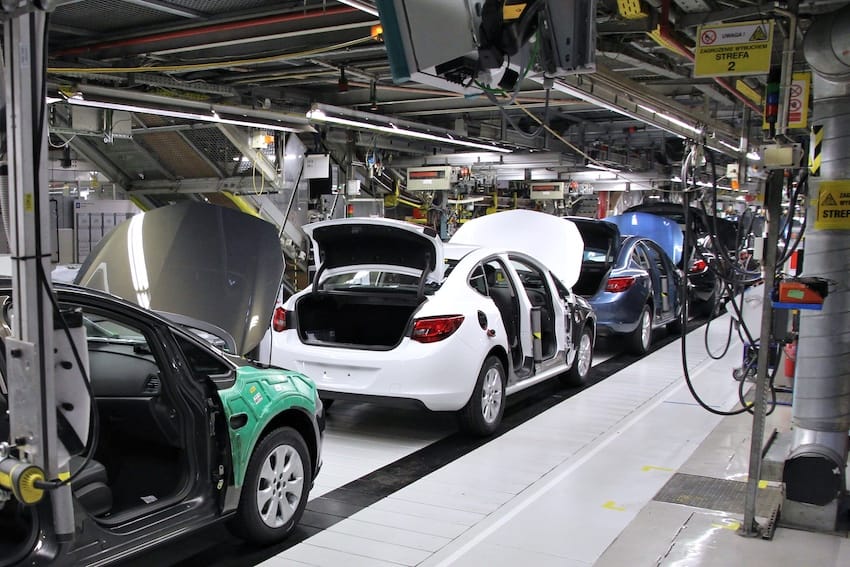In 2023, Mexico’s auto industry had its most productive year since the onset of the COVID-19 pandemic, manufacturing close to 3.8 million light vehicles, according to data from the national statistics agency INEGI.
Vehicle production increased 14.2% in annual terms to just under 3.78 million, the highest number since 2019, when output was 3.81 million units. The year-over-year increase in percentage terms was the largest in 13 years.

Meanwhile, Mexico exported just over 3.3 million light vehicles last year, a 15.2% increase compared to 2022. That was the highest increase in percentage terms in six years, but exports were still 2.5% below the 2019 level.
Nevertheless, the value of Mexico’s auto exports hit a record high of almost US $173 billion in the first 11 months of last year. Data on the value of vehicle exports in December has not yet been published.
Which automakers made the most light vehicles in Mexico in 2023?
INEGI data shows that 76.1% of light vehicles manufactured in Mexico last year were light trucks (SUVs and pickups), while 23.9% were smaller cars.
The top five manufacturers were:
- General Motors, 722,631 vehicles – a 2.8% decline compared to 2022.
Plants in Toluca, México state; Silao, Guanajuato; San Luis Potosí city; and Ramos Arizpe, Coahuila.
2. Nissan, 615,751 vehicles – a 57.5% increase compared to 2022.
Plants in Cuernavaca, Morelos; and Aguascalientes.
3. Stellantis, 467,542 vehicles – a 12.7% increase compared to 2022.
Plants in Toluca, México state; and Saltillo, Coahuila.
4. Ford, 365,365 vehicles – a 20.4% increase compared to 2022.
Plants in Cuautitlán Izcalli, México state; Hermosillo, Sonora; and Irapuato, Guanajuato.
5. Volkswagen, 349,227 vehicles – a 15.7% increase compared to 2022.
Plants in Puebla; and Silao, Guanajuato.
The automakers that recorded the biggest year-over-year production increases in percentage terms in 2023 were BMW (85.1%); Nissan (57.5%); Mazda (36.7%); Honda (32.4%); and Ford (20.4%).
Electric vehicle production in Mexico
Just over 106,000 vehicles of the 3.78 million vehicles made in Mexico last year were electric vehicles. The former figure is equivalent to just under 3% of the total.
Only two electric vehicle models – the Ford Mustang Mach-E and the Chevrolet Blazer EV – are currently made in Mexico, and production only started in late 2023.

Thus, the production of EVs in Mexico should rise in 2024. General Motors is set to begin production of another electric model in Mexico this year, while several other automakers have announced plans to make EVs here.
Industry association chief: production decline in December not part of a trend
Data shows that light vehicle production declined 9.86% annually in December to 215,923 units.
Odracir Barquera, managing director of the Mexican Automotive Industry Association (AMIA), said that the decline is “simply an issue of circumstances” and not part of a trend, explaining that it was due to “reorganizations” at some auto plants. Production is back to normal in January, he said.
Kia, Nissan, BMW, General Motors, Toyota, Ford and Volkswagen are among the automakers that have announced production adjustments at their Mexico plants to introduce new models, including electric vehicles.
The production outlook for 2024
Barquera predicted an annual production increase of around 8.5% this year, which would take total output past 2019 levels.
He said that AMIA is forecasting total light vehicle production of 4.1 million units in 2024, as long as there isn’t “some kind of surprise.”

The best December on record for vehicle exports
While auto production declined in December, exports increased 16% in annual terms to reach 282,316.
Barquera said that the export total is the highest for the month of December since records began in 2005. “It is very strong data,” he added.
The automakers that exported the most light vehicles from Mexico last year were, in order, General Motors; Stellantis; Ford; Nissan; and Volkswagen.
The United States, Canada and Germany were the biggest importers of Mexican-made vehicles last year, with 77% of total exports shipped to Mexico’s northern neighbor.
Domestic vehicle sales up almost 25% last year
INEGI data shows that 1.36 million light vehicles were sold in Mexico in 2023, a 24.4% increase compared to the previous year.
Nissan sold the most vehicles in Mexico – 241,056 – to claim a 17.7% share of the market.
General Motors ranked second with a 13.5% share, followed by Volkswagen (8.4%); Toyota (7.6%); and Stellantis (7.1%).
With reports from El Financiero, El Economista and El Universal
